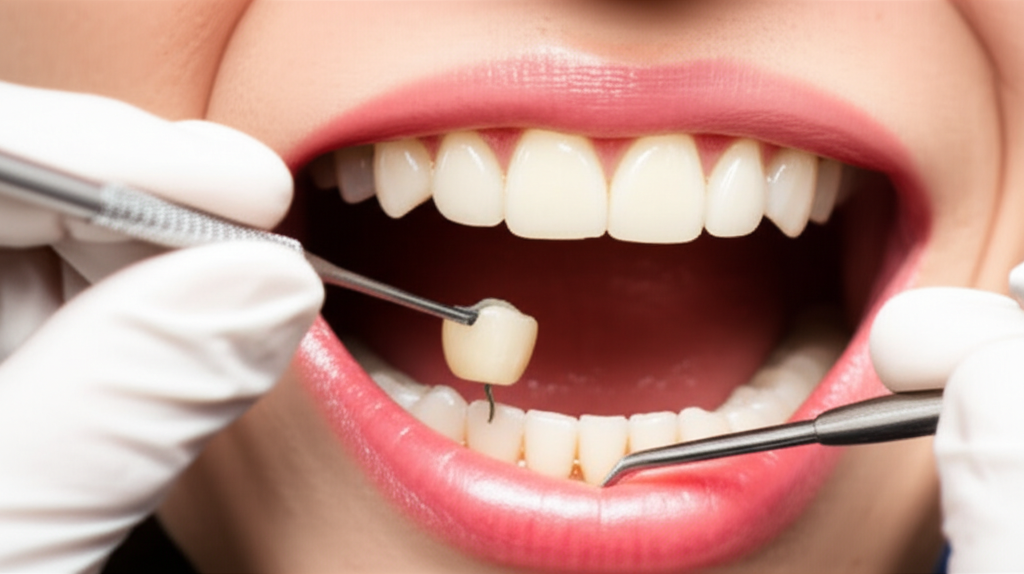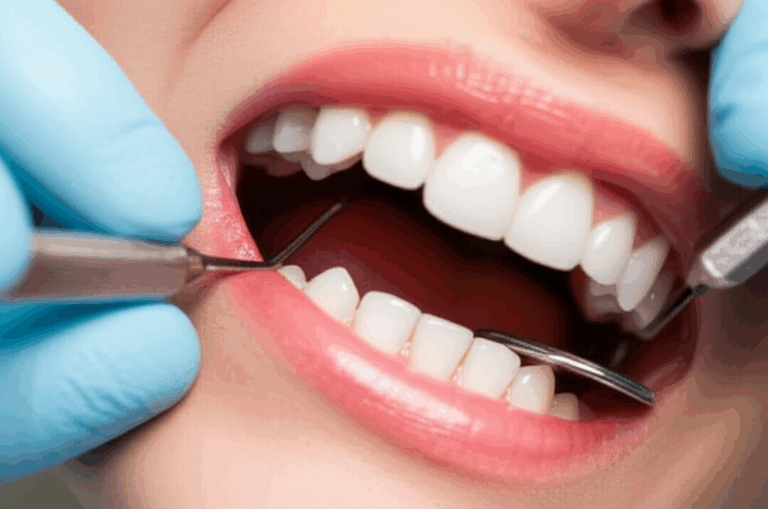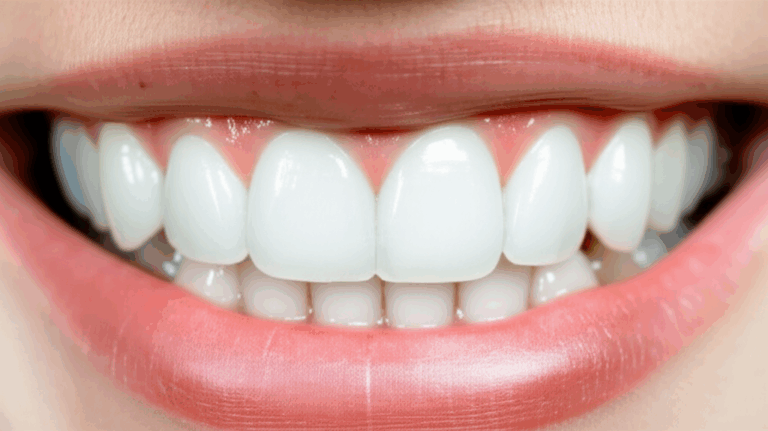
Can a Dentist Adjust a Crown? Here’s What You Need to Know
Dental crowns are like little hats for your teeth. They go over a tooth to keep it safe or to make it look better. But sometimes, something just doesn’t feel right after getting a new crown. Maybe biting feels weird, or your tooth hurts. In this article, you’ll find out why this happens, what your dentist can do to help, and how to make sure your crown feels good. If you ignore these problems, you might hurt, have trouble eating, or even end up needing a new crown. The good news? Most of the time, a quick fix can solve it all. So, let’s see how crown fixes work and why they matter.
Table of Contents
What Is a Dental Crown and Why Might You Need One?
A dental crown is just a cover for your tooth. Dentists put crowns on when a tooth is hurt, not strong, or needs to look better. Crowns can be made from things like porcelain, zirconia, ceramic, metal, gold, or EMAX. Sometimes, you might get a crown after a root canal, a big cavity, or to cover up a cracked tooth.
Why does this matter? Because crowns protect your real tooth, let you eat normally, and help your smile look nice.
But there’s a catch: for a crown to work well, it needs to fit just right. If it doesn’t, you’ll feel it. A crown that doesn’t fit right can make your mouth hurt, cause trouble when you chew, give you headaches, and lead to bigger tooth problems.
Why Would a Dental Crown Need Adjustment?
Let’s say you just got a new crown. You leave the dentist thinking all is good, but later, you feel something’s just not right. This happens more than you’d think.
Common reasons for crown fixes:
- The crown feels too high or tall.
- Your bite feels uneven.
- You feel pain or pressure.
- The crown feels sharp or rough.
- Food gets stuck near the crown.
- There’s a weird feeling or your jaw hurts.
Table: Common Problems That Make People Need Crown Adjustments
| Problem | Symptom | Can it Be Fixed? |
|---|---|---|
| Crown feels high | Pain biting, jaw hurts | Yes, most times |
| General pain or pressure | Ongoing pain, sensitive | Yes, mostly |
| Rough or sharp crown | Tongue/cheek irritation | Yes |
| Food getting stuck/gaps | Trapped food, new cavities | Sometimes |
| Big cracks/chips | Looks broken | Needs new crown |
| Open margins (big edges) | Food traps, decay risk | Maybe, not always |
A crown that isn’t fixed when it should be can cause lots of problems. You might bite your tongue more, get headaches, or even crack other teeth. That’s why it’s smart to see your dentist if something seems wrong.
Does Your Dental Crown Feel Too High?
Ever bite into bread and feel like one tooth hits before the others? That’s called a high spot on your crown.
Why does this happen? When your crown is taller than the rest, it touches first when you bite. This puts extra stress on that tooth and crown.
How do you know if your crown is too high?
- Your bite feels off after your dentist put on a new crown.
- You feel pain when you chew.
- Your jaw feels sore.
- Sometimes you get headaches or your teeth feel sensitive.
Dentists call this “occlusal adjustment” when they fix spots that are too high. They use colored paper that you bite on to see which teeth hit first.
If you don’t take care of this, you might end up with jaw pain or even TMJ problems. But don’t worry. Most times, your dentist can fix it fast!
Is Your Crown Causing Discomfort or Pressure?
Maybe your crown doesn’t seem “high,” but it still feels weird. You might notice steady pressure or even a throbbing feeling.
What causes this kind of pain?
- The crown may be pushing on your gums or not sitting evenly.
- There could be too much cement under it.
- Or, the crown could be a bit too tight on your tooth.
Look out for these:
- Pain that doesn’t go away after a few days.
- Your tooth is sensitive to hot or cold food.
- Your jaw feels tired or sore, even when not eating.
Your dentist can often fix this by gently smoothing the crown or cleaning away extra cement. But don’t ignore pain—it can mean something worse, like a cavity or sore gums.
What If the Crown Feels Rough or Has Sharp Edges?
Does your tongue get scratched? Is your cheek sore from biting it? This can happen if your crown has rough edges or leftover bits after being glued on.
Why does this happen?
- Sometimes, a bit of crown material sticks out after being put on.
- Or, the edge wasn’t smoothed out enough at the dentist office.
How to tell:
- Your tongue always finds a sharp spot.
- You stop eating on that side.
- Floss gets stuck or breaks at the crown edge.
If ignored, this can cause sores or cuts in your mouth. Luckily, dentists can easily smooth these out and fix the problem fast.
Gaps and Poor Margins: Can These Be Fixed?
If food keeps getting stuck between your crown and your gums, you might have an edge problem. The edge is where the crown and your real tooth meet.
Why do edges matter?
- Bad edges let food and germs in, which can give you a new cavity.
- They can also feel weird and bother your gums.
Can a dentist fix this?
- Small gaps can sometimes be fixed if found early. Your dentist may smooth or seal the spot.
- Big gaps or open edges usually mean the crown is the wrong shape. Then it’s better to get a new one.
If you think you have a problem here, tell your dentist fast to stop worse problems, like a cavity under the crown.
How Do Dentists Actually Adjust Crowns?
Let’s look at how crown fixes actually work. This is a normal thing dentists do.
1. Dentist Checks
The dentist will:
- Ask you what doesn’t feel right.
- Look at your crown and test your bite.
- Use colored bite paper to see where teeth hit first.
- Sometimes, take an X-ray to see deeper problems.
2. The Fix
If it’s a high spot or rough edge:
- The dentist might numb you, but you often don’t need it.
- They use small drills and tools to gently take away tiny bits of the crown.
- They’ll have you bite, check, fix again, and repeat until it’s good.
- Then, they smooth the crown so it doesn’t feel sharp anymore.
3. Follow-Up
Your dentist might ask you to come back after a few days. They want to know if things feel better or if you still have any pain.
This quick fix helps you avoid bigger problems later.
What Should You Expect After a Crown Adjustment?
After your dentist fixes your crown, you might wonder how you’ll feel after.
Most people notice:
- A little sensitivity. Your tooth might feel a bit soft, but this usually stops soon.
- Bite feels better! You’ll see eating gets easier and the pain is gone.
- Gums feel happier. No more cheek or tongue getting hurt.
Tips for aftercare:
- Eat soft foods for a day if your mouth feels sore.
- Brush carefully near your crown.
- If pain or weird feelings come back, call your dentist quick.
With good care and a skilled dentist, your crown should last a long time.
When Is It Better to Get a New Crown Instead of an Adjustment?
Sometimes, an adjustment just isn’t enough. Knowing when you really need a new crown matters.
Signs you need a new crown:
- The crown is broken, cracked, or has a big chip.
- There’s a big gap under or at the edge of the crown.
- You have a cavity under the crown.
- Pain just won’t go away, even after a few fixes.
- The color or shape is so wrong you don’t like how it looks.
When this happens, a fix won’t help. The dentist will suggest a fresh new crown so your tooth is safe and comfy.
If you need a replacement, some dental labs, like this crown and bridge lab, can make new ones fast and at a good price.
What Should You Do If Your Crown Doesn’t Feel Right?
Don’t just hope discomfort will stop or try to fix it at home. Doing things yourself, like filing your crown or just chewing on the other side of your mouth, can make things worse. Here’s what to do:
Remember, moving fast means you get help fast.
The Big Reasons Why a Well-Fitting Crown Matters
Why care so much about crown fit? Here’s why.
- You can eat without pain or worry.
- A good fit keeps your real tooth safe under the crown.
- You’ll avoid headaches, jaw pain, or TMJ problems.
- No more gum trouble or food traps.
- A crown that fits well will last years and years, especially if it comes from a trusted china dental lab.
A great crown isn’t just about being comfy—it’s about keeping your whole mouth healthy.
Frequently Asked Questions
Q: Does adjusting a crown hurt?
A: Most times, no! Fixing a crown only takes a small bit off the crown, not your real tooth. You might get a little numbing if needed.
Q: How long does a crown adjustment take?
A: Usually just a few minutes up to half an hour—it depends on what’s wrong.
Q: Can all crowns be adjusted?
A: Most can, like porcelain, zirconia, metal, and ceramic. But some types need special tools, so make sure you see a dentist who knows what they’re doing.
Q: Will I need to pay for adjustments?
A: Sometimes it’s free if you go back soon after getting the crown. But if it’s been a while, check with your insurance.
Summary: Key Points to Remember
- A dental crown should fit perfect so you feel good and keep your tooth safe.
- If your crown feels off, don’t wait! Things like high spots, pain, or sharp edges can be fixed.
- Dentists have special tools to fix crowns fast and without pain.
- Not every problem can be fixed by just adjusting. Sometimes, you need a new crown, like if it’s broken or has a big gap.
- Crowns that fit last longer and keep your mouth healthy.
- For custom dental solutions, check out a trusted digital dental lab.
- Always call your dentist if you have a problem. Quick help means quick relief!
Taking care of your crown is taking care of your smile. If something feels wrong, reach out and let your dentist help.








